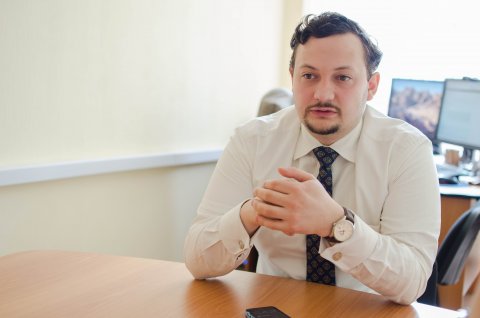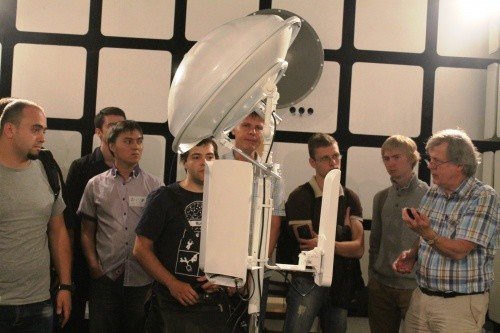PwS@PhD: International School on Software Engineering at SUSU

For the first time, SUSU will become an international venue for education and the exchange of experiences in software engineering between postgrads and researchers from 6 countries and 11 universities. From May 15th through May 28th the international school on Mathematical and Computational Foundations of Program Engineering will be held at the university at the School of Electrical Engineering and Computer Science. Director of the SUSU School of Electrical Engineering and Computer Science Gleb Radchenko told us about the project’s goals, the teaching format, and the unique opportunities for young researchers
– What is the Erasmus+ PWs@PhD International Project and what opportunities does it offer?
– PWs@PhD is an academic project being realized within the Erasmus+ program from the European Union, aimed at the development, modernization, and internationalization of higher education and its research portion at the PhD level and support for the foundation of new PhD programs in software engineering in partner countries. 11 universities are participating in this project: Lappeenranta University of Technology (Finland), University of Rostock (Germany), The University of Central Lancashire (Great Britain), Aalborg University (Demark), The University of Jordan (Jordan), Yarmouk University (Jordan), The Jordan University of Science and Technology (Jordan), South Ural State University (Russia), Ural Federal University (Russia), and other universities. The project is totally financed by funds from the EU and gives postgraduates of partner universities a chance to gain unique experience and skills in bleeding edge methods of software engineering.
– Why was SUSU chosen as the venue for this project?
– SUSU is hosting this many honored representatives of the international academic society for the first time. We are one of the 11 partner universities of the international school. The project was initially thought up as a series of scientific schools in various areas of software engineering for the 2016-2018 period. Every half year a 2-week school for postgraduates for all of the partner universities is organized at one of the universities of the consortium. Our university works very closely with Lappeenranta University of Technology (LUT, Finland) in dual degree programs for a master’s in Informational Technology where many of our talented students work. And it’s natural that LUT, as the project coordinator, referred to us as one of Russia’s leading universities in information technology.

– What meaning does this event have for the university?
– In my opinion, this is a milestone which will move the university to a new level and gives us the unique chance to move SUSU forward within the 5-100 Project. The university will be visited by many international professors and post-graduates who will get to know SUSU’s capabilities and, in the future, we hope that they will consider our university a possible place for their continued studies or research.
– And for participants?
– The project gives participants an opportunity for training the new generation of young researchers and teachers in various scientific areas within software engineering. Postgraduates will gain irreplaceable experience in joint projects and conferences. Taking part in the schools organized at partner universities, postgraduates will have a unique chance to open up new research horizons in software engineering.
– Which school activities you could highlight?
– A whole number of interesting courses are planned within the school which both participants of the school and any interested teachers and postgraduates can attend. For example, professor Janet Read from the University of Central Lancashire (Great Britain) will be offering a course in the mathematical foundations of software user interface. Within this course, she’ll speak about a very interesting, socially-significant project tied to the development of user interfaces for children with special needs. This is a visible example of the fact that mathematics and statistics play an important role in the development of user interface even for such complex tasks. A series of lectures in informational security and cryptography will be read by professor Franck Leprevost from the University of Luxembourg. Mr. Leprevost participated in the development of standards for information security (IEEE-01363, the international standard for open key cryptography), and also acted as an expert of encryption and cryptosystems in the European parliament. From SUSU, teachers of the School of Electrical Engineering and Computer Science will be participating, offering courses on the mathematical foundations of software engineering, modern databases, and data mining methods. I myself will be offering a course in modern methods of organizing distributed computing systems.
– What format will the international school be held in?
– It is an intensive format – lectures in the first half of the day, and in the second half of the day, in the majority of courses, there will be practical lessons. Within the school, specialists invited from Ural Federal University will hold business games in self-organization and schedule planning for researchers. For guest partners, the first day of the school will be a chance to get to know SUSU, visit the international laboratories and museums at SUSU, and on the weekend there will be a packed social program – a trip around Chelyabinsk to see our sights. Also, on May 22nd there will be a trip to Yekaterinburg and Ural Federal University, where school participants will be able to get to know the leading developing companies in software engineering, including the companies Yandex and SKB-Kontur.
.jpg)
– What are the planning results for holding this international school at SUSU?
– The final point will be an international conference on innovative methods of teaching and organizing education in information technology, the theses of which should be included in Scopus. Within the conference, here will be a presentation competition, the winners of which will receive diplomas, and all school participants will receive a certificate for their attendance. But the most important achievement is the organization of comanagement of research projects between postgraduates and professors from the partner universities of the PWs@PhD project. For example, at this time, our postgraduate student Dmitriy Savchenko is completing an internship at the Lappeenranta University of Technology, where he has already sent a scientific article for publishing in an international journal which he published with his advisor at LUT, professor Ossi Taipale. I hope that the meetings between SUSU and partners of the PWs@PhD project will allow postgraduates from partner universities to see us as a place for future productive scientific work.
News Source: https://www.susu.ru/en/news/2017/05/12/pwsphd-software-engineering-international-level
